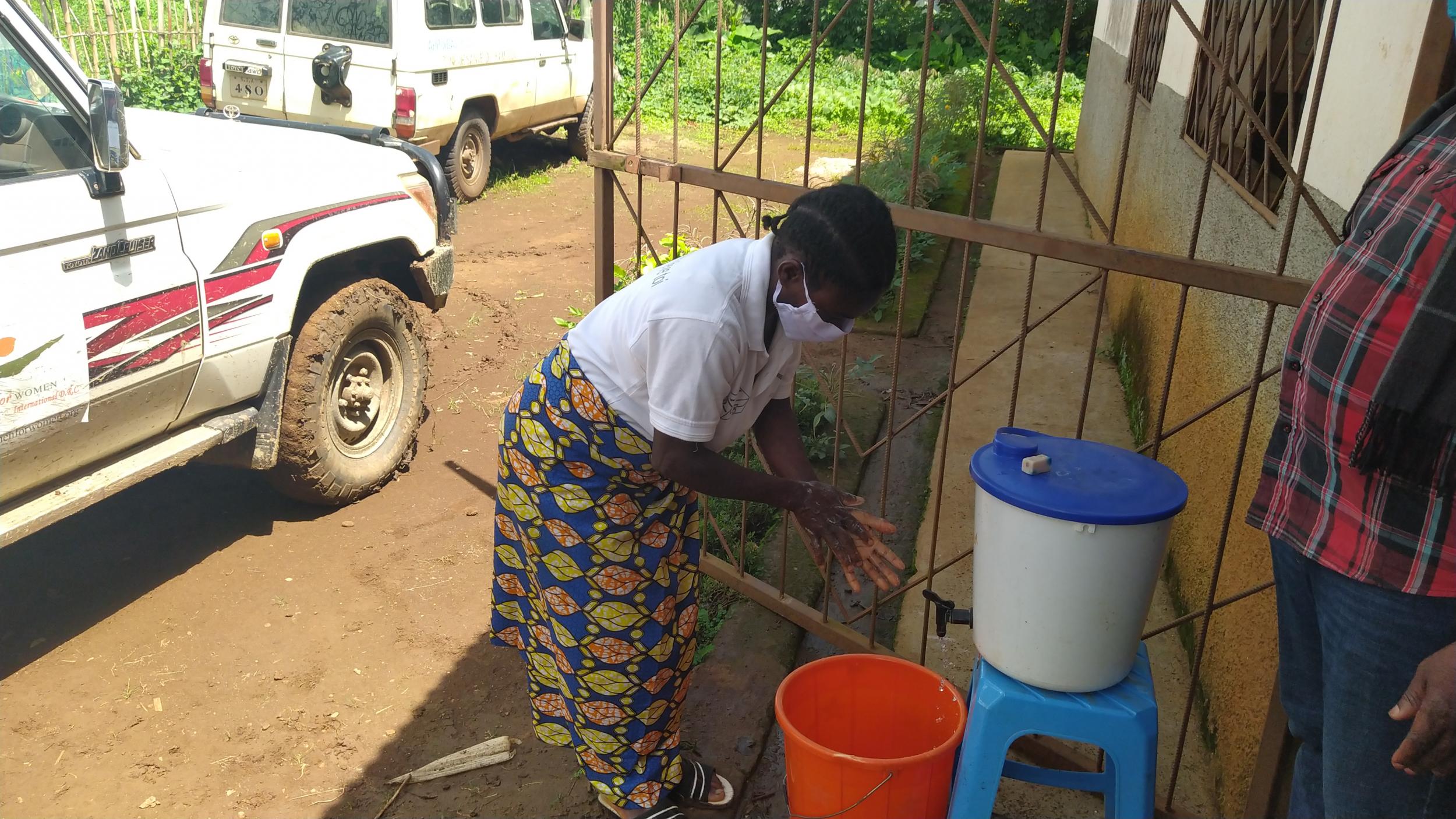How women in the Congo bear the brunt of a ‘lethal combination’ – Ebola and coronavirus
Covid-19 is not the only consideration for a country battling multiple outbreaks. And who is left most vulnerable? Women and girls, as Lucy Anna Gray reports


Baikoko Marguerite Munyatangoyi runs a small business in Kasika, a village in the Democratic Republic of Congo near the Rwandan border. For many it is most recognisable as the location of a 1998 massacre, where approximately 1,000 people were killed, and as one of the poorest places in the Goma region, having struggled with Ebola, measles and cholera outbreaks.
As Covid-19 leaves its mark around the world, communities like this too have had to adapt – but in wholly unique circumstances.
“The price of goods and food have increased shockingly,” the mother-of-seven says. Although she praises improved hygiene and awareness in her community, the government restrictions on movement mean far fewer resources are being transported to the village from Bukavu.
DRC has had just over 4,000 confirmed cases of Covid-19, with 85 deaths attributed to the virus. Not only are these numbers rising daily, but it’s possible they are an underestimate. “In my community in Kasika, I have noticed that many people fear going to the hospital because they think they will be contaminated,” Ms Munyatangoyi says.

Around 2,000km (1,240 miles) west of Kasika is the city of Mbandaka, where another health crisis threatens the country – one DRC has sadly become all too familiar with.
Eight people have been infected with Ebola – four of whom died – in the nation’s 11th outbreak since 1976. One of those who died was a 15-year-old girl. “Ebola was one of the most contagious viruses before Covid... the chances of Ebola spreading remain highly likely,” says Borry Jatta, Ebola response director for the charity Care.
So while most countries focus their attention on coronavirus, DRC must juggle another highly contagious disease – one that more severely impacts people who are already sick. “It is vital that we contain these and don’t have a mixture of the two which would be an absolutely lethal combination,” Mr Jatta says.
After decades of improving their Ebola response, the nation must now relearn how to contain the disease. “Covid does not allow people to come together to develop a strategy against it and go out and engage with communities as they have been doing with Ebola,” Mr Jatta says. Coronavirus makes it much harder for experts to reach areas hit by Ebola, and for supplies to get to those who need them most. Dealing with both these viruses at the same time creates “an explosive context that could make each one of them worse,” Mr Jatta warns.
But these are not the only considerations for people in the Congo. As Ms Munyatangoyi explains: “We talk more about Covid and tend to forget other diseases such as malaria.” This huge country spanning 905,000 square miles has also dealt with the world’s largest measles outbreak, and in 2018, 12 per cent of global malaria cases.
“I was on a call with other countries and I took the floor and said I’m calling from DRC,” UN women representative Awa Ndiaye Seck says, “and in DRC they are cognisant that coronavirus exists and that it kills. At the same time, you have to accept that beyond coronavirus you have Ebola, malaria, yellow fever, all those epidemics that have been killing so many people. So when you come and put resources for coronavirus or Ebola, people accept it, but at the same time they question the prioritisation by putting the focus on these versus the other one. This is their world, this is what they see.”
This dangerous cocktail of diseases not only shines a spotlight on the country’s health systems, but on the huge burden women carry. As a small business owner herself, Ms Munyatangoyi explains most households in her village generate income through small-scale trade and services – most of which are performed by women - such as selling food, tailoring and hair dressing. “Women are the main providers for households, on top of the traditional reproductive role of taking care of loved ones.”
Restrictions to stop the spread of viruses means closing markets, keeping children at home from school, keeping people away from trading. “You have so many women that make a living from the informal sector. When you have Covid it’s a huge stop,” Ms Ndiaye Seck says. “It creates additional stress, additional fear, and how people deal with the fear – the unknown.”
Additionally, women are more likely to become infected with Ebola as the majority of health workers are female. Ms Ndiaye Seck also warns of “shadow pandemics” such as increased domestic violence, sexual and gender-based violence – an issue sadly facing most countries dealing with coronavirus. “When you put all of that together, coronavirus is really making life more difficult than ever before for women and young girls in the DRC – and we don’t know what is next. That’s the most frightening.”
Will the Democratic Republic of the Congo ever be free of Ebola?
Just as regions prepare to officially declare the end of Ebola, a new outbreak surfaces. “Since 2014 we have had an outbreak every 12 to 18 months, so I was expecting this latest one. Unfortunately, this is part of DRC,” Franck Abeille of Unicef says. Although the disease is not unique to DRC, it was first discovered there, and remains prevalent in a lot of wild animals continuously hunted.
“Sometimes you cannot help but wonder if DRC has not built enough resilience,” Ms Ndiaye Seck says, “Now Ebola is coming in a different way because of Covid... When will we say: we declare this country is Ebola free, this country is corona free? Then how much time will we need to pick it up, rebuild businesses, rebuild economic opportunities, find new job opportunities for women and girls.”
One of the biggest lessons learnt over recent decades is the necessity of engaging with smaller communities as a grassroots solution to health education. “A ‘one size fits all’ approach to community engagement isn’t effective,” Dr Zabulon Yoti from WHO’s Emergency Preparedness and Response Cluster in Africa says. “You are asking families to make sacrifices: isolation, quarantine, changes to the way to interact with each other, changes in the way people mourn and bury the dead. So community engagement and community trust is critical.”
The WHO has sent teams of experts to Mbandaka, with essential supplies such as vaccines, testing kits and PPE being shipped from Goma. Health workers, educators and campaigners on the ground have extensive experience in containing outbreaks – but they’ve never faced a situation quite like this. Mr Jatta, a father-of-three himself, says the commitment and selflessness he’s witnessed is inspiring, with many “determined to stay and fight, they care about the vulnerable people of Congo”.
As with virtually any health crisis or seismic negative change in society, women and girls are left highly vulnerable and must be at the forefront of problem solving – something DRC has put great focus on in recent years. The women and girls there “are resilient, hard workers, they inspire you because no matter how tough it is they can still stand up with a smile and try to look at the bright side of things,” Ms Ndiaye Seck says.
Ms Munyatangoyi is an example of someone who has received education on Covid-19 and support for her business, not only changing her life but allowing her to be a bastion of the community. “I am lucky that I was trained on both Covid and Ebola by Women for Women. The knowledge I gained from training is enabling me to adjust and adapt. I am also happy that as a community relay, I am getting the right message to my people.”
Coronavirus cases may continue to rise, Ebola threatens to spread further, and other diseases remain omnipresent – but there is still great hope. This country has experiences like no other in dealing with such epidemics and remains resilient in the fight for a healthier society.
As Ms Ndiaye Seck says, “Justice. Peace. Inclusion at all levels. That’s what we’re calling for. Hopefully all together we will be able to defeat corona and Ebola in DRC for good.”
Join our commenting forum
Join thought-provoking conversations, follow other Independent readers and see their replies
Comments